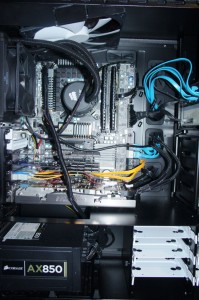 This is The SSD Review Test Bench and a quick click on the photo will bring it up full size for closer inspection.
This is The SSD Review Test Bench and a quick click on the photo will bring it up full size for closer inspection.
TEST PROTOCOL
- Our main goal in testing is to ensure that all test results are as accurate as they can be and no anomalies slip through. We conduct all tests three times and, if necessary, we may conduct specific tests in Windows 7 ‘safe mode’ to ensure the OS has little to no influence on the end result.
- We prefer to use as many benchmark programs as possible to assist with confirmation of results and provide the reader with the actual tests as received to avoid any confusion when unexpected test benchmarks are received.
BENCH CONFIGURATION
MOTHERBOARD: Gigabyte P67A-UD7 ATX LGA 1155 Intel SATA 6Gb/s USB 3.0
CPU: Intel Core i7-2600K Sandy Bridge 3.4GHz (3.8GHz Turbo Boost) 4 x 256KB L2 Cache 8MB L3 Cache LGA 1155 95W Quad-Core Desktop Processor
RAM: Corsair Vengeance 8GB DDR3 1600 SDRAM
GPU: MSI N560GTX-Ti Twin Frozr II OC Edition 1024MB GDDR5 PCI Express 2.0
POWER: Corsair Professional Series AX850 850W ATX12V v2.31 / EPS12V v2.92 80 PLUS GOLD Certified Modular Active PFC Power Supply
CHASSIS: Fractal-Design Define XL ATX Mid Tower Silent Computer Case
CPU COOLER: Corsair H50 High Performance Water CPU Cooler
NETWORK: DiLink Powerline AV Network With D-Link DIR 655 Wifi N Router
DVD: Sony Black 24X DVD+R 8X DVD+RW 8X DVD+R DL 24X DVD-R 6X DVD-RW 12X DVD-RAM 16X DVD-ROM 48X CD-R 32X CD-RW 48X CD-ROM 2MB Cache SATA 24X DVD Writer
STORAGE: 3 x Icy Dock 4×1 SSD Racks for 5.25″ Device Bay
PRELIMINARY BENCHMARKS
Crystal DiskMark x64 V. 3.0
The high sequential performance scores of 394MB/s read and 244MB/s write fell in line with specifications but the two things that surprised us were the 4k random write speeds of 98MB/s and 239MB/s for 4k- QD32. For those who have been following along in past reviews, our assertion of the importance of 4k random write disk access has been clear and consistent and this review affords us an excellent opportunity to show what we mean first hand.
We believe that understanding low 4k random write disk access is the single most important factor in consideration of any SSD purchase as this is in use by the typical user over 50% of the time. In fact, as amazed as we are at those mind boggling high sequential read and write speeds that manufacturers like to advertise in their SSD packaging, it is the low 4k random write performance that provides the user with the largest visible improvement when comparing different solid state drives.
UNDERSTANDING 4K RANDOM WRITE DISK ACCESS
It wasnt that long ago that we were amazed at SSDs reaching speeds of just below 50MB/s in 4k random writes. Only recently did we review the soon to be released OCZ Vertex 3 which just boasted over 100MB/s in its new SandForce SF-2000 series processor. We never expected this drive to come anywhere near that of the Vertex but with 98MB/s for low 4k randoms, watch out because this drive just became best non-RAID solid state drive available on the market today. As coincidence may have it though, both the Vertex and Crucial both utilize Microns new 25nm NAND flash memory.
Would you believe us if we told you this beat out other RAID configured SSDs in performance tests? Follow along and you will see the effect that 4k random disk access has when we compare SSDs of different configurations and how this will definitely assist in your final SSD purchase decision.
Pg1 – Introduction and M4 Characteristics
Pg2 – Benchmark Protocol and Initial Testing
Pg3 – ATTO and AS SSD Benchmarks
Pg4 – HDTune Pro Benchmarks
Pg5 – PCMark Vantage SSD Comparisons and Conclusions
Pg6 – Review Extras!
 The SSD Review The Worlds Dedicated SSD Education and Review Resource |
The SSD Review The Worlds Dedicated SSD Education and Review Resource | 
